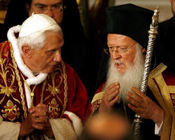The following text has been found on the Turkish TV Channel ATV
Papa 16. Benedict'in İstanbul'u ziyareti sırasında yolların güvenlik nedeniyle kapatılması vatandaşa zor anlar yaşattı Tam anlamıyla arapsaçına dönen trafikte araçlarında uzun süre mahsur kalan İstanbullular saatler sonra yollarına devam edebildi

Simultaneously, Greek National TV reports as follows:
Είκοσι εφτά χρόνια μετά την τελευταία Ποντίφικα επίσκεψη στην Κωνσταντινούπολη, ο Πάπας Βενέδικτος ΙΣΤ έγινε θερμά δεκτός στο Φανάρι από τον Οικουμενικό Πατριάρχη Βαρθολομαίο. Σε μια ιστορική στιγμή για την πολυπόθητη ενότητα των εκκλησιών, οι κορυφαίοι πνευματικοί ηγέτες εκατομμυρίων πιστών συναντήθηκαν στην έδρα του Οικουμενικού Θρόνου. Προηγουμένως οι δυο θρησκευτικοί ηγέτες παρακολούθησαν μαζί τη δοξολογία στον Πατριαρχικό Ναό του Αγίου Γεωργίου, προσκύνησαν από κοινού τα λείψανα των Αγίων Γρηγορίου του Θεολόγου και Ιωάννου του Χρυσοστόμου, και αντάλλαξαν θερμούς λόγους με την ευκαιρία του ιστορικού γεγονότος

Some 27 years after the last time a Pontiff had visited Istanbul, once known as Constantinople, Pope Benedict XVI was warmly welcomed Wednesday evening in Phanar by Ecumenical Patriarch Bartholomew-"first among equals" of the leaders of the Orthodox Christian churches. In a landmark moment for the much-anticipated reconciliation of the two Churches, the spiritual leaders of millions of Christians held talks at the seat of the Ecumenical Patriarchate. Earlier, they had attended a mass at the Patriarchal Church of St. George, bowed to the holy relics of Saints John Chrysostom and Gregory and exchanged warm greetings on the occasion of such a momentous event.
It is comforting to see that for Turkey, the papal visit caused more problems on a practical (traffic) level than on religious grounds, whereas the relationship between
East and West Rome appeared to be more complex. The english translation of the Greek text contains a description of the Orthodox Patriarch which is not mentionned in the original: "first among equals". Has the english translation been manipulated for the use of those who do not understand Greek, in order to mark the difference of hierarchical status of the two church leaders?
Whatever the reasons for these linguistic contorsions, the most impressing phenomenon during the formal meeting, as shown on Greek TV, was the contrast between the impressive and wellarticulated, musical voice of Patriarch Batholomew and the thin voice and heavy German accent in the response (in English) of the Pope.
4 comments:
My dear friend, do you want make me belief, besides your excellent knowledge of French, Italian and English you also command Greek and Turkish language? Come on that’s not true.
In fact, I am not fluent in modern Greek, but I can read it. For Turkish, I admit that I had to bluff, but the context of the traffic jam image was so convincing that even for me modest notion of the Turkish vocabulary, the interpretation of the accompanying text did not present a problem.
J'admire également votre capacité de passer d'une langue à l'autre. Pour les Français (dont je fais partie), globalement ce n'est pas une chose aisée...
Pour ce qui me concerne, j'ai appris le grec moderne qui est une langue que j'aime énormément. J'étais inscrit aux Langues orientales à Paris et ai passé le diplome, à l'époque où j'étais étudiant. Malheureusement, je n'ai plus parlé cette belle langue et je l'ai oubliée. La seule chose qui me reste, c'est l'accent.
Le nom du lien de votre site internet est très hellénisé. "Filefteros" (que j'écrirais peut-être "Phileftheros"), c'est celui qui aime la liberté, non ? Avez-vous des liens avec le pays ?
Par rapport aux liens, je vous remercie d'avoir mis le mien dans votre liste ; je crois, en revanche qu'il ne fonctionne pas bien.
Amicalement.
Philhellènement vôtre.
http://holbein.free.fr/
Cher Holbein,
En effet, filelefteros n'est autre que l'ancien "philéleutheros" (ami de la liberté), présent dans le nom du journal chypriote (grec) et qui est cité régulièrement par la presse turque, avec l'orthographe que j'emploie pour mon blog.
Quelle était mon intention? Favoriser une réflexion sur les mots et leur contenu dans un contexte de l'ouverture îndispensable de l'Europe vers l'Est et surtout vers le Levant.
à propos du lien à votre site: je crois avoir pu le faire fonctionner.
Post a Comment